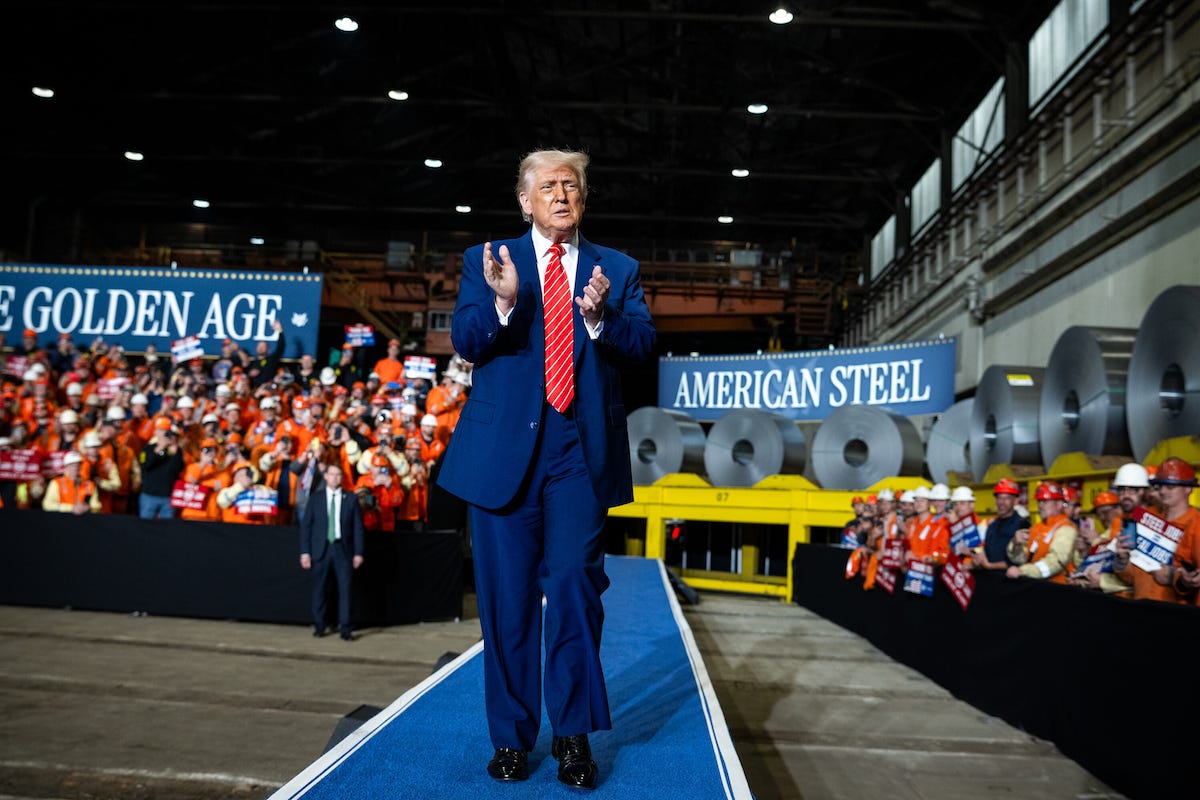Uncle Sam is a terrible board member
Why the government’s Class G share in U.S. Steel are a disaster in the making
Uncle Sam used to be just an icon; now he’s a fellow board member. In December 2023, Japan’s Nippon Steel announced its intention to acquire U.S. Steel in a $14.1 billion transaction. The deal’s timing couldn’t have been less propitious; it got subsumed by electoral machinations, with jobs in Pennsylvania a key sticking point for both Trump as candidate and the incumbent Biden administration. Biden ended up blocking the deal, and Trump vowed to follow along.

That is until late Friday, when Trump reversed himself and signed an executive order approving the transaction. A Trump about-face isn’t exactly newsworthy. What is surprising, though, is that the deal will need to follow a national security agreement signed between the companies and the U.S. government. Details of the agreement weren’t offered in U.S. Steel’s press release or SEC filings, but The New York Times says that it has extensive governance provisions:
Under the terms of the national security pact, which the companies said they signed Friday, the U.S. government would retain a single share of preferred stock, called class G — as in gold. And U.S. Steel’s charter will list nearly a dozen activities the company cannot undertake without the approval of the American president or someone he designates in his stead.
Activities requiring the president’s permission include the company transferring production or jobs outside the United States, closing or idling plants before agreed-upon time frames and making certain changes to how it sources its raw materials.
In addition to the legal rights associated with the Class G stock, the Times also reported that the president would have direct power over the composition of U.S. Steel’s board:
The president has the authority to directly appoint one of the board’s three independent directors, and approve or reject appointments for the other two, the two people familiar with the negotiations said.
U.S. Steel’s board currently consists of 10 members, all of whom are considered independent as non-executives except for CEO David B. Burritt. The company was originally expected to become a wholly-owned subsidiary of Nippon upon closing, eliminating both its stock and presumably its board of directors, with control via Nippon’s Japan-based leadership. Now, it appears that the new holding company, 2023 Merger Subsidiary, Inc. (guess whether the legal or marketing department came up with that one!) will be wholly-owned, but wedged in with some sort of board.
In addition, the Times reported:
The golden share in U.S. Steel cannot be transferred or sold by a future president, they said. They also described the share as “noneconomic,” meaning that it would not affect the size of other U.S. Steel shareholders’ stakes or give the U.S. government the chance to directly profit from U.S. Steel in the form of dividends.
In short, Uncle Sam — in particular, the president — now has permanent influence over the future of U.S. Steel, and even worse, that influence is purely political and not even economic. One doesn’t need paeans to Milton Friedman’s shareholder revolution to realize that adding board directors with entirely divergent interests from the well-being of the company he or she directs is a tragedy in the making.
Consider the consummation of this deal itself. Blocked by Biden and also denounced by Trump on the campaign trail, the merger was fought via arbitration by the steelworkers union, which remains deeply wary of the deal up to the present day. That’s in spite of Nippon’s commitment of $11 billion for expansion in the United States over the remainder of Trump’s term, and also its plans to erect a new steel mill that would add another $3 billion in investment.
This shortsightedness shouldn’t be surprising, as the story here isn’t one about business strategy and growth, but rather elegiac politics. U.S. Steel is deeply uncompetitive in the global marketplace, with out-of-date technology, an inefficient and expensive workforce, and a poor strategy for growth. It’s unsurprising the company has stagnated for years. Yet, steelmaking holds the imagination of the American voter, and so no politician on either side of the aisle wants to push the industry to where it needs to go.
Nippon Steel’s merger proposal was thus a godsend, and not just a financial one. As I wrote in the Pittsburgh Post-Gazette earlier this year against Biden’s decision to oppose it, Nippon was offering America an opportunity to import innovation from more competitive overseas businesses. “President Joe Biden’s decision to block the sale of U.S. Steel to Nippon Steel is unlikely to be reversed by Donald Trump,” I wrote, “but the greater question now is whether America can unlearn decades of deindustrialization and come to terms with today’s reality: we need all the help we can get — even in our most sensitive industries — if we are going to rebuild and reindustrialize for a more abundant, prosperous, and secure future.”
Trump came around to this view once he secured the presidency. Perhaps Commerce Secretary Howard Lutnick, who led the negotiations and pushed hard for a deal, better understands U.S. Steel’s realistic prospects than others.
Now we have a new set of challenges: how will the government vote its Class G share? How would a future U.S. president order his or her directors on the company’s board to vote if consolidation leading to layoffs was necessary for the company’s competitiveness? Or automation to improve efficiency? Will they vote for the long-horizon strategy that ensures America has a quality steelmaker, or will they tactically vote to protect short-term interests with a view to headlines and the next ballot? Remember, these directors have no economic interest in the company. They answer only to the president — present and future — and his or her whims.
That’s very different from the corporate governance fights that have been taking place in Silicon Valley over the past two decades. When Google IPO’d in 2004, the company’s two founders, Larry Page and Sergey Brin, as well as its CEO, Eric Schmidt, created Class B stock that offered them supervoting privileges at a ratio of ten to one. In the company’s shareholder letter, they argued this was necessary for ensuring the company’s continued success:
In the transition to public ownership, we have set up a corporate structure that will make it harder for outside parties to take over or influence Google. This structure will also make it easier for our management team to follow the long term, innovative approach emphasized earlier.
And
New investors will fully share in Google’s long term economic future but will have little ability to influence its strategic decisions through their voting rights.
Such a structure was not unprecedented. Companies like Ford and a few others have had dual-class structures for many decades. Since Google’s IPO, tech companies have regularly proposed dual-class structures in their public market prospectuses, and even pushed the envelope forward. Snap infamously moved to a three-class model, with public investors receiving zero votes for their Class A shares, a first for a publicly traded company. During its direct listing process in 2020, Palantir proposed a three-class structure that ultimately passed SEC muster and gave unilateral and permanent control through supervoting Class F shares to the company’s three founders, Alex Karp, Peter Thiel and Stephen Cohen.
As Google’s letter attests, the bargain on offer here is weakening external governance in exchange for the promise of longitudinal leadership that can keep the keen competition of the tech industry at bay. Critical to that bargain of course is that the founders of these tech companies have overwhelmingly large economic interests in the success of their businesses. While corporate governance experts still debate the implications of these unequal structures, empirically, it’s increasingly clear that the model works when one looks at the market caps of America’s leading tech companies.
That Class G share threatens to cloud every board strategy session with the malaise and stagnation of modern American politics
U.S. Steel is the complete opposite paradigm, with that Class G share threatening to cloud every board strategy session with the malaise and stagnation of modern American politics, where economics and governance are orthogonal. When you add in the heavy unionization of the company’s steelworkers, the company’s future is now a tripartite war between executives, workers and politicians — all while it struggles to compete against an onslaught of advanced and efficient Chinese steelmakers, who collectively outproduce America more than 12-fold.
Yet, it’s not just the steel industry we should be worrying about, but the wider precedent this deal sets. With the expansion of the U.S. government’s authority to investigate and approve foreign transactions under the FIRRMA law passed in 2018, will other deals suddenly have Uncle Sam cozying up at the board table, ready to offer his parochial perspective, nay, commands? Unproductive job creation in battleground election states will be prioritized more than ever before — an outcome we’ve already seen in the defense industrial base.
There is a reason after the fall of the Berlin Wall that the neoliberals of the Washington Consensus pushed for the privatization of state-owned enterprises. A company can’t serve multiple masters at the same time. Technological change is commonplace, requiring companies to regularly adapt to productive innovations at the frontiers of the economy. That evolution is almost always counter to the incumbent interests of employees (and even many managers and executives), but a board exclusively focused on the long-horizon success of a company can make the tough calls when needed.
Take the example of China, that great industrial policy giant, which made reforming its bloated state-owned enterprises a pillar of its 1990s economic policy. It’s a decision that cost tens of millions of jobs, but ultimately resulted in one of the greatest wellsprings of wealth in human history.
I can’t see a future U.S. president making such a tough call against the friction of electoral politics and nostalgia, not now and not ever. The G-man now has his Class G share, and we are all going to suffer mightily with Uncle Sam sitting at the board table.





